SCB’s carbon offset projects for 2017
SCB and ICCB participants have contributed to 1700 tCO2e which correspond to the equivalent of 883 Colombians' annual CO2 output. Thanks to the contribution of ICCB participants, about 95% of ICCB 2017 carbon emissions were offset. SCB is to contribute some fund to offset 100%. The funds collected are to be dispersed equally to two certified environmental projects in Colombia which are administered by Fundación Natura Colombia. These projects will contribute to local and regional benefits related to biodiversity conservation, climate change, social development.
The Grouped Project for Commercial Forest Plantations Initiatives in the Department of Vichada (project video here) aims to promote investments in new sustainable commercial forest plantations in Puerto Carreño’s Municipality, based on changing the land use from extensive cattle ranching to sustainable forest productive systems. The expected climate benefits are the mitigation of climate change, increases in carbon sequestration (CO2) and regulation of waterways (which encourages adaptation to climate change impacts). The expected benefits on biodiversity are an increase in forest covers and enhancement of connectivity of forest ecosystems, as well as the conservation of the flora and fauna in the region. Locally, the benefits for the community include the direct and indirect creation of employment, technical training in forestry tasks, and development of social and productive infrastructure, which affects the quality of life of the population.
The land within the project boundary is degraded grassland for all cases of the grouped instances, as they all occur in the same baseline conditions. For the first instance, it is expected to reforest around 12,172 ha with commercial plantations, using the species Acacia mangium, Eucalyptus tereticornis, Eucalyptus pellita, Hevea brasiliensis, Pinus caribaea, Gmelina arborea and other 18 native species. However, the potential total area is 25,000 ha.
Key facts:
- Project goal: Changing land use from extensive cattle ranching to sustainable forest productive systems by reforesting and restoring at least 4,000 ha of degraded land;
- Verified by VCS (Verified Carbon Standard) and CCB (Climate, Community and Biodiversity Standards);
- Climate: reforestation will deliver an average carbon sequestration of 1 million tCO2e per annum by 2025 (currently 400k);
- Biodiversity: increase in forest cover and enhancement of connectivity of forest ecosystems, as well as improvement of waterways, the conservation of riparian and gallery forests, and other restoration of flora and fauna in the region;
- Social: creation of employment, technical training in forestry management, and development of social services and roads, which together improve the quality of life of the local population.
The Project Proponent is Fundación Natura Colombia, which is a non-profit and non-governmental organization (NGO) whose mission is to promote the conservation of biodiversity and the sustainable use of natural resources.
More information about the project can be found in the CCB Standards project report and the VCS Validation project report.
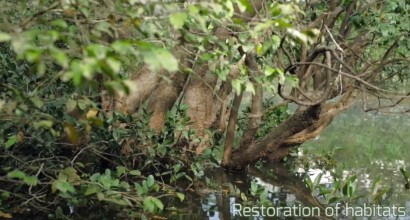 |
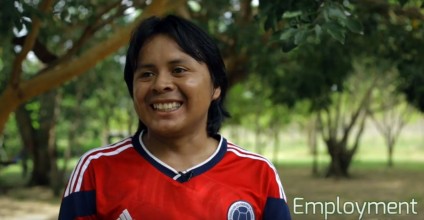 |
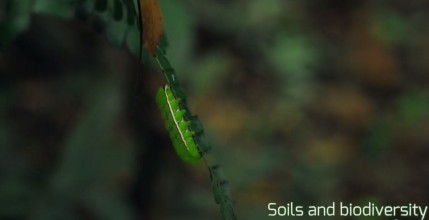 |
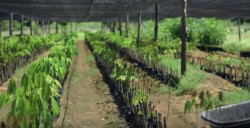 |
Cooking Stove Project
The VPA Santander-Robles project (project video here) considers the replacement of approximately 4,900 traditional inefficient stoves with efficient devices in the municipalities of Charalá, Coromoro, Encino, Gambita and Mogotes, all of them in the Department of Santander, Colombia. The project activity will generate an average emission reduction of 8,624 tCO2e per annum. The VPA will be implemented as a component of a Gold Standard Micro Program of Activities. The project is focused on the distribution of necessary materials and knowledge, construction and monitoring of the operation of improved cook stoves (hereinafter ICSs) for the lowest-income households of rural areas. The enumerated activities have as an ultimate goal lowering the consumption of firewood, abate greenhouse gas emissions and indoor air pollution as well as reduce the pressure on non-renewable biomass resources within the project boundary, located in rural areas of the region.
The need for lessening pressure over last remaining Andean oak forest located at northeastern Colombian highlands drove Fundación Natura to bring about framework for encouraging conservation of this forest species which one was banned for long time. Andean oak´s wood is very appreciated as fuelwood by rural communities in such region of country, due to its “apparent” availability besides of its “good ember” because of high density of wood, so fuelwood consumption became a stressing activity for these forests. In the purpose of resolving this concern was necessary address it from demand-side by means of strategies would be able to reduce fuelwood consumption.
Key facts:
- Project goal: reduce the consumption of firewood by constructing replacing 4,900 traditional inefficient stoves with efficient cooking stoves in rural communities of the Country of Colombia;
- Verified by The Gold Standard;
- Health: reduced inhalation of smoke reducing stomach and respiratory cancer, intense respiratory infections, headaches and muscle pain;
- Climate and biodiversity: reduction of wood consumption, reduced deforestation, improvement of water sources and average emission reduction of 8,624 tCO2e per annum;
- Women empowerment: 97% of household cooks are women and children, significant reduction of time required to collect firewood, allowing more time for studying and working.
The Project Proponent is Fundación Natura Colombia, which is a non-profit and non-governmental organization (NGO) whose mission is to promote the conservation of biodiversity and the sustainable use of natural resources.
More information about the project can be found in the Gold Standard micro-program report.
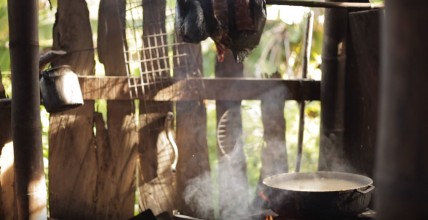 |
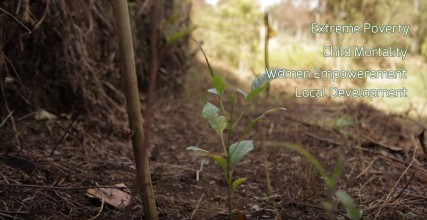 |
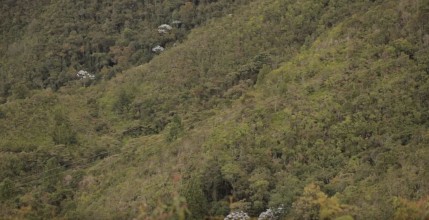 |
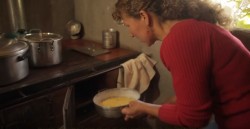 |
Photos courtesy of Fundación Natura Colombia